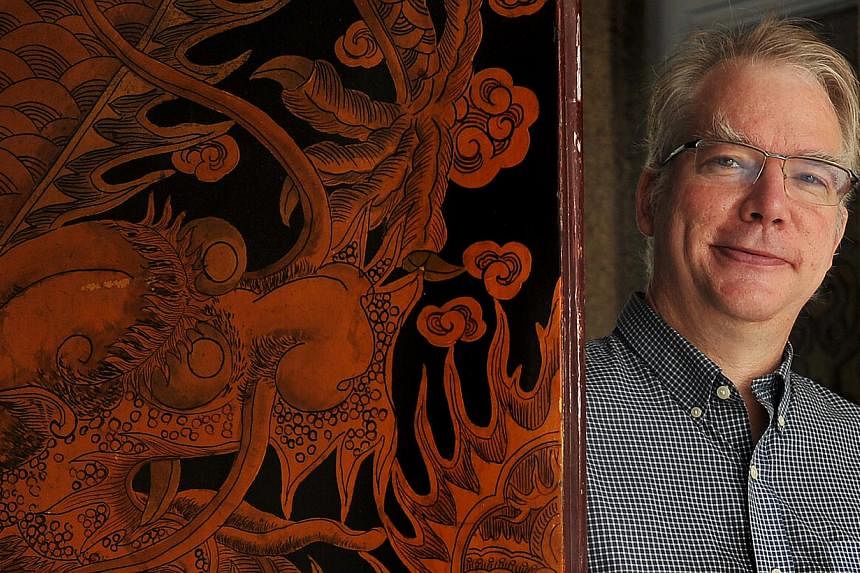He may be Caucasian but Professor Kenneth Dean is an expert on Chinese literature and culture.
In fact, he will head the department of Chinese studies at the National University of Singapore (NUS) in January - the first non-Chinese to hold this position since the department was established in 1953.
The 58-year-old holds dual American- Canadian citizenship and has a degree in Chinese studies from Brown University and a PhD in Asian languages from Stanford University.
He speaks Mandarin, English and French fluently, as well as some Hokkien, German and Japanese.
Prof Dean has taught graduate level courses in Mandarin and written academic articles in Chinese.
Throughout his academic career, he has studied numerous aspects of Chinese literature, culture and philosophy, including Tang dynasty poetry, stories and essays by 20th-century Chinese writer Lu Xun, fengshui, Chinese medicine and Buddhist and Taoist texts.
He credits his proficiency in the language to spending over 25 years in Mandarin-speaking environments - China, Taiwan and Hong Kong - and his life-long interest in Chinese culture.
"I have a great respect for Chinese culture - its key values of courtesy and humaneness, its strong endorsement of virtuous conduct and its conviction that people can always improve themselves," he says.
"Studying new topics and documents in Chinese has always helped keep my passion for the language alive. I have also had many wonderful friends and teachers who helped me learn Chinese."
Since 2006, he has been a visiting professor at NUS teaching courses on Chinese religion and South-east Asian Chinese temples.
About three months ago, Prof Dean accepted NUS' offer to head the department, which he has always held in high regard.
"I am very honoured and excited to be moving to Singapore to take up this new position," he says.
An NUS spokesman says Prof Dean was chosen because he has an outstanding reputation in the field of Chinese religions, and is one of the world's leading scholars in Chinese popular religion.
Says the spokesman: "He will strengthen the department's research on the linkages between South-east Asia and China, as well as the Ming and Qing dynasties in China, which are two of the department's research foci."
Adds Associate Professor Su Jui-Lung, 52, the department's current acting head: "Professor Dean's Chinese is excellent. I can talk to him in Mandarin about everything.
"He is a researcher at the cutting edge of Chinese religions, and his books on popular religion in Fujian province have become classic studies in the field."
The elder of two sons, Prof Dean was born in Holland to two American diplomats.
At the age of six months, he was taken to Taiwan, where his father was stationed for about eight years, on and off.
In his formative years, Prof Dean learnt Mandarin from his parents, who are fluent in the language, and Hokkien from the two Taiwanese maids serving his family.
"Before I turned one year old, I was speaking a mix of Hokkien, Mandarin and English."
As a child, he recalls being fascinated by Chinese temples in Taiwan and the massive celebrations held in them.
"There'd be fireworks exploding, clouds of incense drifting around and colourful banners and costumes all around the temple - my senses were overwhelmed," says Prof Dean, who has also lived in China and Hong Kong.
"Yet, among all the chaos, I could sense some sort of order. The experience was so powerful, I sometimes still dream about these celebrations."
As he grew older, so did his interest in all things Chinese.
The biggest obstacle to mastering the language is a lack of an "immersive linguistic environment", he notes.
"Some Singaporeans speak in a mixture of English and Mandarin, but this can be problematic because it prevents them from developing a strong vocabulary in either language," he points out.
"The best way, I feel, is still immersion - travelling or studying in Chinese-speaking environments. Having more classes and subjects taught in Chinese at the primary, secondary and junior college levels will also help, as this will enable students to use the language at a higher level later in life.
In 1974, Prof Dean became so proficient in Chinese that he wrote his college application essay to Brown University in the language, and was admitted.
For the last 25 years, he has been a professor at McGill University in Canada.
He is married to a 59-year-old American musician and they have two children, aged 30 and 26.
His family is based in the United States and Canada, and will visit him regularly when he moves to Singapore in January.
"My whole family can speak Mandarin and write some Chinese. We feel this is an invaluable skill, given China's growing global influence," he says.
He says this of Singapore: "I'm constantly amazed at the linguistic skills of my NUS counterparts, as well as those of Taoist priests, temple leaders, teachers, writers and newspaper professionals in Singapore.
"I expect to learn a great deal from everyone here."
NUS student Dean Wang, 26, who will be pursuing a PhD in Chinese studies, has approached Prof Dean to be his PhD supervisor. He says: "I'm very inspired by him because of his interest in Chinese temples here.
"On one of our visits to the local temples last year, I observed that he knew so much about them - from the stone inscriptions to the words on the flags to the designs on the roofs and pillars.
"He is really one of the best in the field, and there's a lot I can learn from him."


